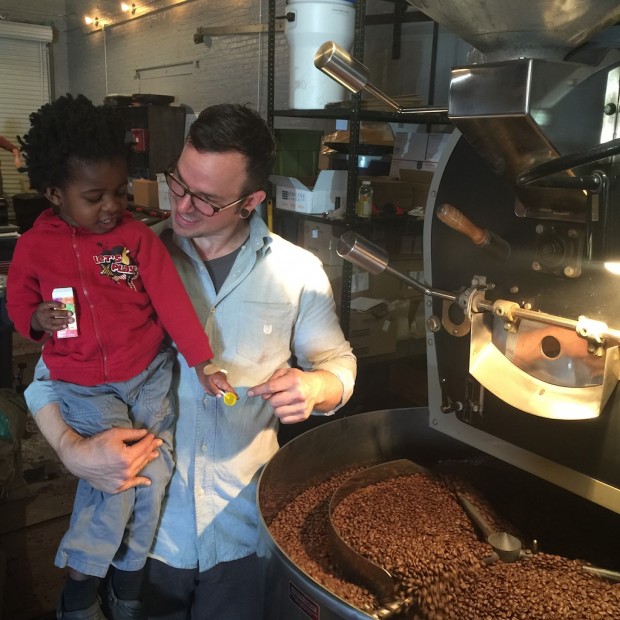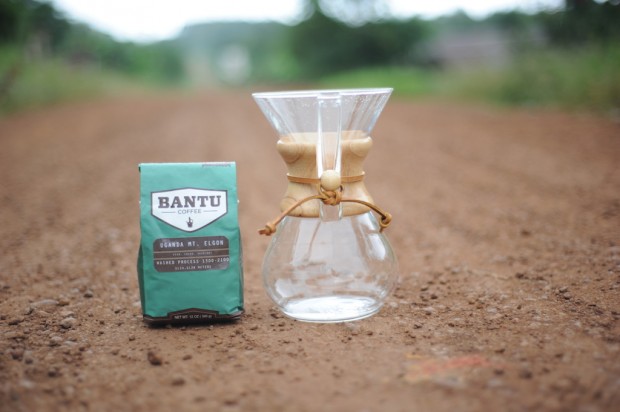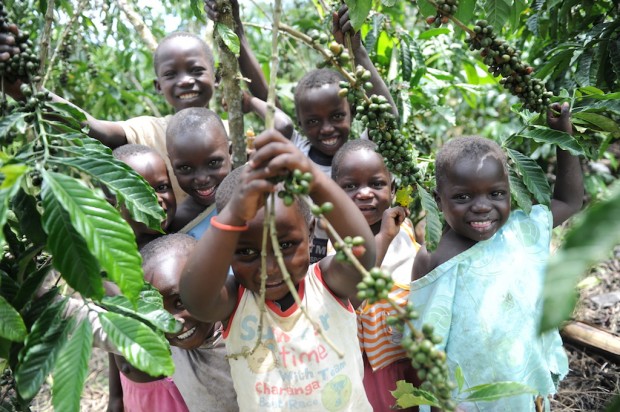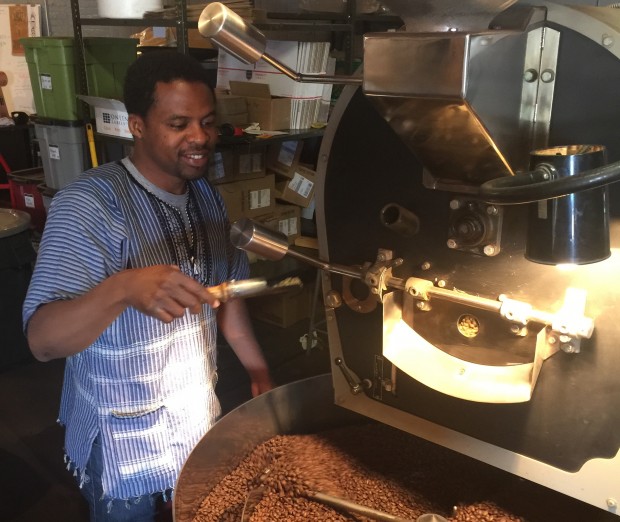Many specialty coffee roasters take pride in their efforts to deal with farmers directly for as much green coffee sourcing as they can. From these arrangements, farmers can benefit financially, and both parties can look to the future with relative confidence — roasters for a reliable supply of quality coffee, and farmers for a better and more stable wage.
Yet the motivations of the burgeoning company Bantu Coffee, founded earlier this year by a son of East African coffee farmers who’s currently enrolled in the Harvard Kennedy School of Government, run much deeper. And while Bantu’s direct connection to its coffee farmers is profound, the company’s founders hope its business model can create lasting change through agriculture reinvestment and financing.
As a social enterprise offshoot of an earlier philanthropic microfinance project, Bantu Coffee’s goal is to assist their own suppliers as well as farmers throughout East Africa and beyond. “I believe very much that our social enterprise can extend beyond Africa,” Bantu Coffee founder Andy Agaba told Daily Coffee News. Agaba is debating whether to add Haiti or Costa Rica to his travels come Spring Break this year, based on so many pictures and videos he receives in his email from struggling farmers and rural communities there.
Nicaragua, Papua New Guinea, and Indonesia are all places with communities he’d like to assist in his mission to provide support for farmers. Said Agaba, “I’m dreaming that there are no limits for the kind of impact that we can have.”
Agaba and his wife Sonya founded the non-profit micro-finance venture Hiinga in 2012 with the goal of raising communities in central Uganda out of poverty through agriculture. Strategies include community organizing through the training of local leaders who in turn galvanize and train a local farming workforce to cultivate foods and other crops that provide nutrition and livelihood.
Through US-based micro-financiers, loans are given to farmers in the form of supplies, farming education and other practical resources. After at least one profitable harvest, the farms then pay the loans back, plus a manageable amount of interest. Proceeds from the interest are then re-invested into other new Hiinga farming projects.
Fundraising to scale the micro-finance venture upward, however, proved difficult. And from this difficulty, the seeds for Bantu Coffee were sewn. About a year ago, Agaba headed to San Francisco with high hopes for the generosity of progressive and deep-pocketed businesses there. After a week of meetings, Hiinga had found no commitments and no donations. “I had planned for that trip for almost an entire year. My hopes were dashed,” Agaba told Daily Coffee News. “I found myself in that moment of discouragement, like, how are we going to grow in 2015? How are we going to serve more farmers?”
Disheartened, but gracious nevertheless, Agaba upon his return home set out to arrange his customary thank-you gift of Ugandan coffee to be sent to the host with whom he stayed in the Bay Area for the week. It’s a product from Agaba’s homeland, also a region that Hiinga helps. “In my region, most people have coffee trees growing in their banana plantations, because banana plantations are good for shading the coffee trees,” said Agaba. “Almost everybody knows coffee-growing.”
It has always seemed like an ideal gift to donors and friends, given that coffee is a staple that all recipients enjoy and appreciate. “It was one of those moments where I was like, ‘woah, wait a minute…'” Agaba paused to reflect on how his host could surely afford to buy a bag of coffee, how prevalent coffee consumption is throughout the US, and how perfectly it grows in so many places in East Africa. “It was really a light-bulb moment for me,” said Agaba. “We can sell coffee here, and we can invest in the farmers.”
In early 2015, the Agabas, along with Carly Getz in San Francisco and the brothers Jonathan and Tyler Hershey in Pennsylvania — no relation to the chocolate empire — founded Bantu Coffee as a standalone company whose mission runs in tandem with Hiinga. “Our hope is that the coffee would eventually be a more predictable way to get finances to farmers,” Agaba said. “But it’s too early to tell.”
For every one-year subscription to Bantu Coffee, the company provides African farmers with 52 new coffee trees to plant. While Bantu would love to source coffees exclusively through the farms it assists the most, these are often tiny farms still in early development whose entire yields are not yet enough to provide a sustaining wage. The company will also do better to provide consumers with a fuller range of products from around the world, anyway. So the roasted coffees Bantu sells come mostly from larger, more established plantations in Africa and elsewhere, while the proceeds to go to support both the existing farms through fair pricing and the aspiring farms through donations of plants and resources.
When not tending to his duties at the Kennedy School, Agaba returns to East Africa up to four times per year. He visits family as well as some of the farms that supply and benefit from Bantu. Agaba also visits communities that have reached out in seek of collaboration, such as in high-altitude regions in Rwanda that are ideal for coffee-growing but need a leg up in getting started. Stateside, Bantu handles the importation of coffees from East Africa while also purchasing Latin American coffees from other importers, including small quantities through a small importing operation started by a Kennedy School classmate.

Andy Agaba’s son, CJ, pictured with a partnering roaster, incorporating a lemon sucker as a sensory analysis tool.
Roasting occurs in Pennsylvania as well as in North Carolina through partnerships with established coffee companies that provide private-label service. Bantu sells coffees online through individual purchases as well as annual subscription plans. They also partner with local organizations and churches to hold coffee-tasting events at which the beans are sold and the name is spread through channels of people who care.
This, to Agaba, presents a safer and more organic path to growth than to pursue coffee shops at so early a stage. “Through that, I believe we can not only build some equity as a brand, but also maybe get enough leverage and financial capital to begin thinking about our own coffee stores,” said Agaba. “Better to bite what we can swallow.”
Howard Bryman
Howard Bryman is the associate editor of Daily Coffee News by Roast Magazine. He is based in Portland, Oregon.
Comment
1 Comment
Comments are closed.









Great work